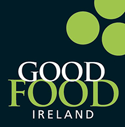
Dr. Colin Sage, UCC Lecturer and founding member of The Cork Food Policy, joined us at the cookery school last Thursday night to speak on the topic that "keeps him up at night": Reimagining A Food System For Ireland. He prefaced his talk by stating that he felt among like minds speaking to the Slow Food family. The ideals out of which lasting change is born are most often met with scepticism, rebuke or a total lack of acknowledgement from the rest of the world before being accepted. When you don't have to spend your time making a pitch, convincing people that your message is worth listening to, space is created for inspiration, dynamism and an exchange of ideas. And that is exactly how our Slow Food evening unfolded.
Great night @BallymaloeCS talking about @CorkFoodPolicy with @litfesti @atasteofir @aideensinn and others all working for #Irelandfoodpolicy
— Colin Sage (@Envirofood) March 11, 2016
The Cork Food Policy was established by a group of people who had become increasingly uncomfortable with the existing food system in Ireland and were motivated to effect positive change at a local level. Cork may currently boast the moniker 'The Food Capital of Ireland', but what does this really mean if increasing numbers of Cork families struggle to put nourishing food on the table each evening? What does it mean if we continue to import more and more of our produce? Or, if food banks are on the rise? There is an urgent appeal in these questions to, as a community, wake up to the realities of the global food production system and the divergent tactics and inefficiencies of our elected government officials. With the country currently celebrating the anniversary of the creation of the state, why not, Colin suggested, allow this to serve as inspiration for a move away from a "silo-ization" of our policies and re-envision them in a holisitic way?
It is alarming to note the growing disconnection in Ireland between what we produce and what we eat. Set to become the most obese country in Europe, Ireland needs to start thinking about drastically changing our attitude to food. How do we do this?
- Give precedence to our domestic instead of our export market
- Reposition artisan foods from the 'luxury' category (Colin commended SuperValu for steps they are taking in this area)
- Renew and reinvigorate the farmers' market movement, as well as linking them to welfare provision to poorer families
- Public procurement opportunities - universities, hospitals, etc. buying local food
- New civic networks - recovering conviviality around food by establishing cooperatives, etc.
And this last point, of course, is at the very heart of the international Slow Food movement. Colin gave the example of GAS - "gruppi di acquisto solidale", ethical buying groups who purchase collectively from local producers and then distribute among their members, which works extremely well in Italy. He also spoke of having encountered community kitchens in Hobart, Tasmania where there was a real sense of celebration in the local food traditions. Ireland needs to rekindle this sense of pride in our own food heritage.
We also need to look around us at our immediate environment and consider how it can be used by schools or civic growing schemes. Cork City's New City Development Plan 2015-2021 has committed to expanding the city's "green space". Already, there has been a successful recovery of a number of derelict sites, such as The Churchfield Allotments on the North side of the city, and Kyle Street in the inner city. The vision Colin referred to more than once during his lecture was "greening the historic spine" of the city, putting any available growing space to use.
@CorkFoodPolicy @Envirofood @BallymaloeCS greening the city, a way to educate consumers and growers! Council#food pic.twitter.com/FSOQsv1P03
— Aideen Sinnott (@aideensinnott) March 10, 2016
While Cork City might currently be a somewhat grey city, it is a centre of life-long learning with a vibrant university and technology institute, both of which offer excellent courses in the areas of food science and the culinary arts. The hinterland of Cork County thrives with artisan food producers and boasts a number of very successful farmers' markets. In addition, we pride ourselves here at Ballymaloe Cookery School on educating as many people as possible on the art of sustainable living, equipping our students with the skills to grow, cook and make their living from food.
The key word of the evening was 'community' - we must work together to bring out this kind of change. We must empower our local producers in order to diversify the current retail ecology, which only serves large corporations who care nothing for our health and well-being. We must unearth and celebrate again our unique food traditions. We must reimagine our cities and towns, viewing their sore spots as places of possibility and potential. We must tackle food poverty as a priority, ensuring access to a nutritious, balanced and affordable diet for our fellow citizens. Above all, we must educate the next generation - how to grow, how to cook, how to innovate.
Comments From The Audience:
"There is a type of 'guerilla food activism' happening in West Belfast. Young 20-somethings are taking over derelict buildings and making green sites of them to send a message to the local chip shops etc. that they want something different."
"As a butcher, I find that customers coming into the shop just lack the courage to ask for particular cuts of meat. But if they hear me explaining to the customer in front of them how to cook a ham hock, for example, they are more likely to then buy it there and then. It's just about education".
"In the Basque country in Spain, I experienced a situation where local families pay a monthly subscription, and then they all come together and cook"
"In addition to considering 'Slow Food', we should consider 'Slow Health' at the same time. We should not continually depend on doctors and pharmaceutical companies to restore our health."
"In Ireland, the top grade of our food produce is exported. In Italy, for example, Grade 1 Parmesan is kept in the country. We need to be doing the same thing."







